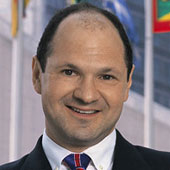U.S.-Russia: Friends or Foes?
Are Russia and the United States becoming more and more alike?
February 22, 2001
From the perspective of other leading industrialized countries, the parallels between Russia and the United States are striking. For starters, Russia and France are the only two countries in the Group of Eight against whom the United States never actually fought a real war. And, to a surprising degree, considering all the underlying hostility, whenever Americans and Russians met — either on the Elbe River in 1945 or in outer space in the 1970s — they actually got along exceptionally well.
For the most part, the G8 countries are, part and parcel, an egalitarian bunch. Japan has one of the world’s narrowest gaps between the rich and the poor. But the concept of social equality also prevails in Germany, France, Italy, Canada and even Britain. The lone exceptions to the rule are the United States, the G8’s biggest economy, and Russia, by far the smallest.
The concentration of income and assets at the top of the social pyramid has, of course, always been a characteristic of the United States. During the past two decades, the trend has exacerbated. The top 20% of the U.S. population now owns around 60% of all assets.
In Russia, since the collapse of the Soviet Union and its enforced egalitarianism, inequality has become dramatic. Some 85% of the Russia’s financial assets are concentrated in Moscow, which has less than 10% of the country’s population. Admittedly, that even outdoes the splendor of New York City and its equivalent of Russia’s “dacha” territories on Long Island and in Connecticut.
But newly found affinities between Russians and Americans probably stem from more fundamental traits of the national character.
Both nations were blessed with vast territorities — much of it sparsely populated. Although Siberia has been part of Russia since the time of Ivan the Terrible, large-scale migration and settlement occurred only in the latter part of the 19th century. It was about the same time when Americans moved to settle the West.
The size of the landmass has created a special mindset that shaped the two countries’ national psyches. Their problem has always been to settle the new land, rather than get a greater yield from a small parcel.
This also may explain why Russians have been so carefree about pollution: it’s easy to move on if thousands of miles of virgin land lie before you. And that is also why Americans watched with indifference the decline of its beautiful cities in the 1960s and 1970s.
Americans and Russians are oriented toward new frontiers — and perhaps that is why both countries spearheaded humanity’s push into outer space. But it also means that Russia and the United States will probably continue to clash on the world stage, where new frontiers are in an ever-diminishing supply.
Read previous
Rumsfeld’s Russian Assault
February 21, 2001
